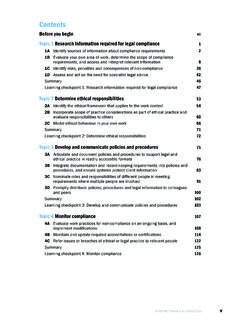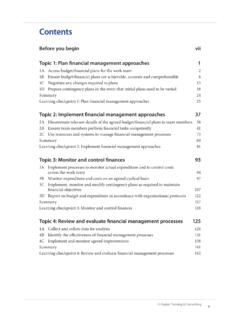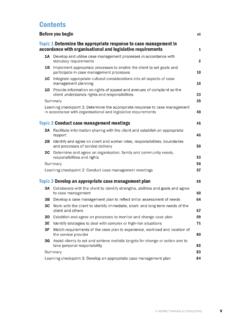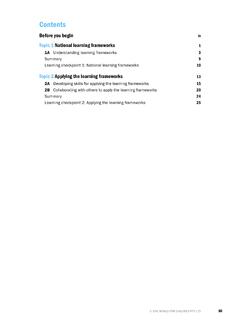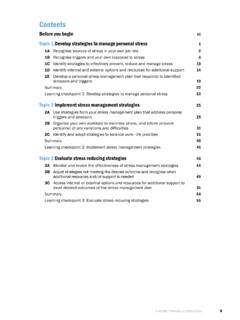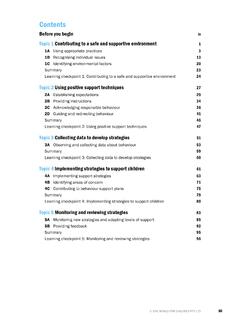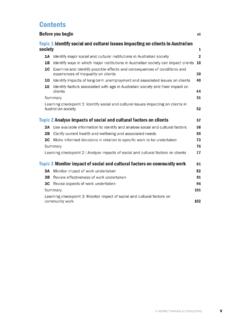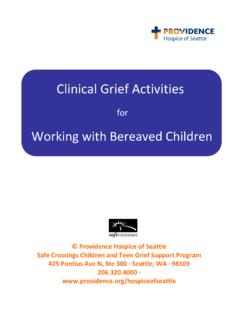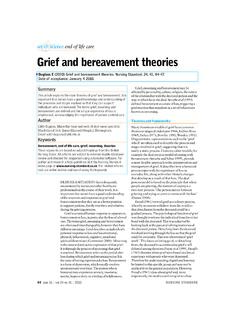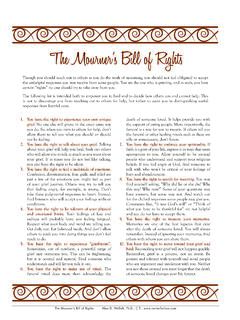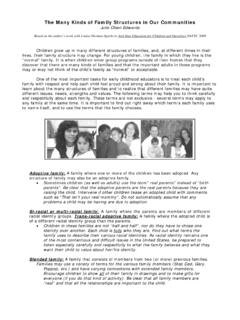Transcription of CHCCCS017 Provide loss and grief support Release 1
1 ASPIRE TRAINING & CONSULTING vContentsBefore you begin viiTopic 1 Recognise reactions to loss and grief 11A Recognise reactions to loss and grief 21B Take into account social, cultural, ethnic and spiritual differences 171C Identify situations where there may be risk to the health and safety of the person or other people and make appropriate referrals 221D Identify and assess an individual s suicide risk and where necessary refer to appropriate services 32 Summary 42 Learning checkpoint 1: Recognise reactions to loss and grief 43 Topic 2 Engage empathetically 472A Interact with individuals with empathy, sensitivity, professionalism and courtesy 482B Identify and respect social, cultural, ethnic and spiritual differences 552C Select and use verbal and nonverbal communication approaches that acknowledge the individual s emotional needs 63 Summary 70 Learning checkpoint 2.
2 Engage empathetically 71 Topic 3 Offer support and information 753A Identify individuals who experience difficulty with grief and trauma and link or refer them to options for further help as needed 763B Provide information about grief and bereavement support services and resources 843C Identify, suggest or use strategies for formal and informal grief and bereavement support 933D Obtain feedback from individuals to confirm that options are clearly understood 983E Maintain confidentiality in line with organisational practices 105 Summary 114 Learning checkpoint 3: Offer support and information 115 Topic 4 Care for yourself 1194A Monitor own stress level 1204B Recognise and minimise risk to self 1244C Identify and respond to the need for supervision and debriefing 130 Summary 138 Learning checkpoint 4: Care for yourself 139 Topic 5 Review support provided 1415A Reflect on outcomes during and after support is provided 1425B Identify where further support is required 1455C Review practices for continuous improvement 149 Summary 154 Learning checkpoint 5: Review support provided 1558 CHCCCS017 Provide LOSS AND grief SUPPORTC ognitive responsesCognitive responses to grief include:XXconfusion and/or difficulty concentratingXXreduced self-esteem and a loss of confidenceXXconstantly thinking about the deceased personXXdenialXXhopelessness XXa change in world view, questioning of values and beliefs and/or search for meaningXXsuicidal ideationXXfear of going responses Behavioural responses to grief include.
3 XXhelplessnessXXpoor dietXXoveractivity or underactivity XXsocial withdrawal XXagitation XXneglect of responsesPhysiological responses to grief include:XXloss of appetite XXsleep disturbances XXtiredness XXweight loss or gainXXsusceptibility to illness XXfeeling responsesBeing aware of the range of grief responses can help you plan the support required, as shown the range of responses allows you to :XXidentify whether a person s reactions are expected responses to grief or whether they are having atypical reactions and require additional supportXXidentify the stage of grief the person is in; for example, if they are in the initial stage of shock or they are beginning to integrate their lossXXconsider how the context and circumstances of the loss may impact the way a person grievesXXnormalise what the person is experiencingXXconsider the appropriate or necessary type of support required.
4 ASPIRE TRAINING & CONSULTING12 CHCCCS017 Provide LOSS AND grief support instrumental grieving Instrumental grievers:XXtake a more rational, cognitive approach to grief XXmay immerse themselves in activity to avoid dwelling on their loss XXare often reluctant to express their feelingsXXprefer to grieve privately rather than publicly. Instrumental grievers may prefer to spend time alone and not want to talk about their grievingIntuitive grievers:XXexperience grief as intense waves of emotionXXexpress their grief openly by crying or showing anguishXXseek support from otherswant to talk about their grievers may benefit most from being encouraged to express their feelings and seek support from bondsIn the past, bereaved people were often encouraged to let go of the deceased person by severing emotional bonds and ties with them.
5 More recent approaches suggest that it may be more helpful for the bereaved individual to develop and maintain a continuing bond with the continuing bond means finding a way of maintaining a relationship with the person who died. This may include focusing on happy memories of the deceased person and remembering the positive aspects of their life, rather than the sadness of their death. By establishing a continuing bond with the deceased, the bereaved person constructs a new relationship with them that is a source of comfort and solace. By maintaining this, the grieving person can more easily integrate the loss into their ongoing life. Meaning reconstructionMeaning reconstruction focuses on how an individual makes sense of a significant loss. For an individual to integrate their loss, they need to find meaning in the event and circumstances that disrupted their life and sense of coherence.
6 Bereaved individuals need to piece together their lives by exploring the meaning of the loss through talking about it. This helps them rebuild their life without the deceased person. Integration occurs when they are able to incorporate the loss into their life. ASPIRE TRAINING & CONSULTINGv023322 ASPIRE TRAINING & CONSULTINGCHCCCS017 Provide LOSS AND grief SUPPORT1C Identify situations where theremay be risk to the health and safety of the person or other people and make appropriate referralsLoss, grief and bereavement are highly stressful experiences that can have a range of impacts on an individual s health and wellbeing. Health and wellbeing are based on a balance within a person s mental, physical, emotional and spiritual life. Negative life events, such as the experiences of loss and grief , disrupt and unbalance an individual s sense of wellbeing and may drain them of energy.
7 You need to be able to recognise the elevated risk of negative impacts associated with loss and assist grieving individuals to obtain appropriate impacts of a loss in health and wellbeing Loss may affect physical health in a number of ways, which in turn lead to negative impacts on an individual s social and emotional health. Some of these physical impacts are show below. physical impacts of loss includeXXexhaustion and a lack of energyXXheadachesXXlowered immunityXXhigh blood pressureXXdisrupted sleep XXa rapid pulseXXshortness of breathXXdigestive complaintsXXa loss of appetiteXXworsened pre-existing conditions, such as asthma or skin ASPIRE TRAINING & CONSULTINGCHCCCS017 Provide LOSS AND grief SUPPORTWork role boundariesWhere there is a need that you are unable to meet because you lack the skills or knowledge to perform the task, you may be able to seek support for training as part of your regular appraisal with your supervisor.
8 If there is a need that is to be met immediately, inform your supervisor that you require training as soon as possible. Conditions such as mental illness, intellectual disability or dementia can affect a person s ability to clearly express their needs and can lead to behaviours that are outside the scope of your training to manage. In such situations, you may be able to discuss the difficulties with your supervisor, or request that a health professional (such as a behavioural psychologist or GP) assess the person s limitationsThe organisation you work for may not have the capacity to cater to the needs of an individual. If this is the case, inform your supervisor of the identified need that is unable to be met so the person can be referred to a service that can meet this need. If the person s individual plan does not address a need that the person requests and the need is something that you could meet, the person s needs should be assessed and their individual plan revised.
9 Exampleidentify situations where there may be risk and make appropriate referralsAfter his wife dies in a car accident, Brian tries to pull himself together for the sake of his children. His wife died instantly in a head-on collision while driving. Brian thinks he is doing okay, but he is troubled by the traumatic nature of her death. Thoughts and images keep popping into his head. He tries to carry on with his life, but finds it increasingly difficult. His asthma seems to have worsened. He finds it difficult to get out of bed in the morning and do basic things like make breakfast. He does not feel like seeing anyone or doing anything, and wonders if life is worth living. His wife s parents offer to take care of the children for a while, but Brian feels they are really planning to try to take the children away from him. When a friend, Julie, who is a community service worker, comes to visit him and explains that if he does not get help he may not be around to see his kids grow up, Brian decides to take action.
10 Julie tells him that he is experiencing symptoms of unresolved grief and trauma, and that he needs to get help. She recommends that he see his doctor about his health concerns and ask for a referral to a counsellor to help him deal with his reactions to his wife s ASPIRE TRAINING & CONSULTINGCHCCCS017 Provide LOSS AND grief a person loses someone close to them or something personally significant tothem, they experience and grief may affect people in many ways and also impact families includes a wide range of emotions, thoughts and behaviours. While a grievingperson may experience many common feelings and reactions, it is important toremember that responses may need to take into account cultural and other differences when , grief and bereavement are highly stressful events that can have a rangeof impacts on a person s health and wellbeing.
